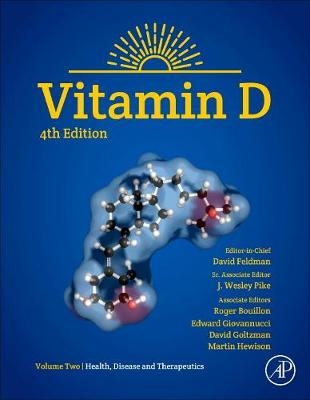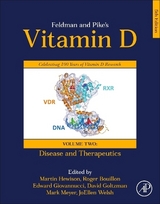
Vitamin D
Academic Press Inc (Verlag)
978-0-12-809963-6 (ISBN)
- Titel erscheint in neuer Auflage
- Artikel merken
This collection represents a who’s who of vitamin D research and the coverage is appropriately broad, drawing in internal medicine, orthopedics, oncology and immunology. Clinical researchers will gain a strong understanding of the molecular basis for a particular area of focus.
Prof. Hewison’s work focuses on different facets of vitamin D physiology, including classical skeletal effects and non-classical extra-skeletal effects. He has a particular interest in the interaction between vitamin D and the immune system, where antigen-presenting cells such as dendritic cells and macrophages synthesize active vitamin D (calcitriol) and also express the nuclear receptor for calcitriol (VDR). Vitamin D can therefore act as an endogenous regulator of both innate and adaptive immunity by enhancing antibacterial activity, and modulating antigen presentation and T lymphocyte function. Crucially these responses are highly dependent on the bioavailability of vitamin D, and Prof. Hewison has hypothesized that immune function is influenced by vitamin D status in humans. His group is using a variety of models to test this hypothesis including basic molecular and cell analyses, and vitamin D supplementation trials in human cohorts. A key objective of his work is to increase awareness of vitamin D-deficiency in the UK population. Roger Bouillon, MD, PhD, FRCP, biography Roger Bouillon is professor (emeritus since 2010) in endocrinology (internal medicine) at the University and University Hospital of the Catholic University of Leuven (K.U.Leuven) in Belgium. He is a member of the Royal Academy of Medicine (Belgium) and a Fellow of the Royal College of Physicians (London). He was a founding member and later President of the European Board of Endocrinology (UEMS 1988-2002). He was a member of several European Science Foundation Committees (Board member of the European Medical Research Council) and of the European Space Agency Life Science working group till 2012. He is past-president of the International Bone and Mineral Society (2011-13 ) and is co-organizer of the vitamin D workshop. He was vice president for research of the University of Leuven from 1995-2005. He is coauthor of more than 500 peer reviewed articles that generated about 26,000 ISI citations and a H index of 82. The topics of his research deal with (1) several aspects of diabetes an endocrinology in general but his main research focus deals with (2) hormonal aspects of bone and calcium homeostasis and this spans the spectrum of basic, translational and clinical research. (3) Vitamin D is a major research focus throughout his scientific career. Papers: Edward Giovannucci's research focuses on how nutritional, genetic, environmental and lifestyle factors relate to various malignancies, especially those of the prostate and large bowel. Much of his work is centered on large ongoing cohort studies, including the Nurses Health Study, the Health Professionals Follow-Up Study and the Physicians Health Study. A specific area of interest is the etiologic mechanisms underlying the relation between modifiable factors and cancer risk. His work has included the study of how nutrition and other lifestyle factors impact on cancer risk and progression by influencing levels of insulin, insulin-like growth factors, vitamin D metabolites, and steroid hormones. Another area of interest is how nutrients may interact with genetic susceptibilities in determining an individual's risk. David Goltzman is Professor in the Departments of Medicine and Physiology of McGill University, Director of the McGill Centre for Bone and Periodontal Research, and Senior Physician in the Endocrine Division of the Department of Medicine of the McGill University Health Centre. His research has focused on the hormonal regulation of mineral and skeletal homeostasis, and he has made many important contributions to our knowledge of parathyroid hormone (PTH), PTH related peptide and vitamin D, which have had major impact on our understanding of a variety of metabolic bone diseases. He is also principal investigator of the Canadian Multicentre Osteoporosis Study (CaMos) which examines the demographics, development, risk factors and outcomes of osteoporosis. Dr. Goltzman has received various honours and awards, including the Aurbach Award of the US Endocrine Society, the Raisz Award of the American Society for Bone and Mineral Research (ASBMR), fellowship in the Royal Society of Canada and in the Canadian Academy of Health Sciences, the Order of Canada, an honorary professorship from Nanjing University and the degree of Doctor Honoris Causa from the University of Athens. He is a past President of the ASBMR, the Canadian Society of Clinical Investigation and the Canadian Society of Endocrinology and Metabolism.
Volume II: Health, Disease and Therapeutics
Section VII. Population Studies: Vitamin D Deficiency, Nutrition, Sunlight, Genes & Trials 58. Methods of evaluating population studies of vitamin D: strengths & weaknesses 59. Worldwide vitamin D status 60. Vitamin D in Foods: An Evolution of Knowledge 61. Determinants of Vitamin D Deficiency from Sun Exposure: A Global Perspective 62. Vitamin D Fortification and Supplementation Policies to Correct Vitamin D Insufficiency/Deficiency Globally 63. Vitamin D and Food Fortification 64. Bariatric Surgery, Vitamin D, and Bone Loss 65. Genetics of the Vitamin D Endocrine System 66. Randomized Clinical Trials of Vitamin D for the Primary Prevention of Cancer and Cardiovascular Disease, with a Focus on the VITamin D and OmegA-3 TriaL (VITAL)
Section VIII. Disorders 67. Vitamin D deficiency and nutritional rickets in children 68. Vitamin D and Osteoporosis 69. Adult Vitamin D deficiency: fracture & fall prevention 70. Clinical Disorders of Phosphate Homeostasis 71. Vitamin D hydroxylation-deficient rickets, type 1A: CYP27B1 mutations 72. Hereditary 1,25-Dihydroxyvitamin D Resistant Rickets 73. The Role of Genetic Variation in CYP2R1, the Principal Vitamin D 25-hydroxylase, in Vitamin D Homeostasis 74. Infantile Hypercalcemia and CYP24A1 Mutations 75. Drug and Hormone Effects on Vitamin D Metabolism 76. Vitamin D and Organ Transplantation 77. The role of vitamin D in type 2 diabetes and hypertension 78. Vitamin D, obesity and the metabolic syndrome 79. Vitamin D and Renal Disease 80. Calcitriol and Analogs in the Treatment of Chronic Kidney Disease 81. Idiopathic Hypercalciuria and Nephrolithiasis 82. Hypercalcemia Due to Vitamin D Toxicity 83. The Hypocalcemic Disorders 84. Vitamin D: Cardiovascular Effects and Vascular Calcification 85. Vitamin D and Paget’s Disease
Section IX. Vitamin D Analogs 86. Analogs of Calcitriol 87. Non-Secosteroidal Ligands and Modulators of VDR 88. Bile acid-derived vitamin D receptor ligands 89. Bifunctional Vitamin D Hybrid Molecules 90. Modulating Vitamin D Receptor–Coregulator Binding with Small Molecules 91. Extended-release Calcifediol in Renal Disease 92. Vitamin D Receptor Antagonists 93. Eldecalcitol and Osteoporosis
Section X. Vitamin D and Cancer 94. Overview of vitamin D actions in cancer 95. Vitamin D Status and Cancer Incidence, Mortality and Prognosis 96. Effects of Vitamin D Derivatives on Differentiation, Cell Cycle and Apoptosis in Hematological Malignancies 97. Vitamin D actions in mammary gland and breast cancer: genomics, metabolism and stem cells 98. Vitamin D Urologic Cancers 99. Vitamin D and Colon Cancer 100. Vitamin D and Skin Cancer 101. Vitamin D and Lung Cancer 102. Vitamin D inflammation and cancer
Section XI. Immunity, Inflammation and Disease 103. Vitamin D and Tuberculosis 104. Vitamin D and Adaptive Immunology in Health and Disease 105. Vitamin D and Innate Immunity 106. Vitamin D and Diabetes 107. Vitamin D and Multiple Sclerosis 108. Vitamin D and Inflammatory Bowel Disease 109. Psoriasis and other Skin Diseases
Section XII. Therapeutic Applications and New Advances 110. Sunlight protection by vitamin D compounds 111. Vitamin D, Cardiovascular Disease and Hypertension 112. Vitamin D, Acute Respiratory Infection, and Asthma/COPD 113. Vitamin D and Muscle Performance in Athletes 114. Vitamin D: Presence and Function in the Eye 115. Adult vitamin D deficiency and adverse brain outcomes 116. Vitamin D in Pregnancy and Lactation: Moving into the Future 117. Vitamin D and Critically Ill ICU Patients
| Erscheinungsdatum | 07.11.2017 |
|---|---|
| Verlagsort | San Diego |
| Sprache | englisch |
| Maße | 216 x 276 mm |
| Gewicht | 3560 g |
| Themenwelt | Medizin / Pharmazie ► Physiotherapie / Ergotherapie ► Orthopädie |
| Technik ► Medizintechnik | |
| ISBN-10 | 0-12-809963-1 / 0128099631 |
| ISBN-13 | 978-0-12-809963-6 / 9780128099636 |
| Zustand | Neuware |
| Informationen gemäß Produktsicherheitsverordnung (GPSR) | |
| Haben Sie eine Frage zum Produkt? |
aus dem Bereich



